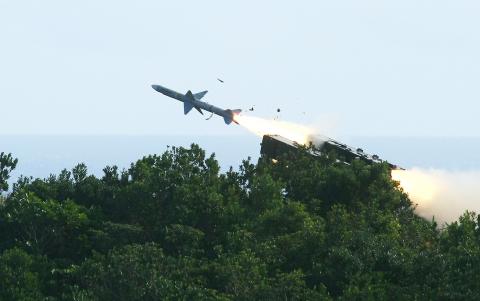Several hundred AIM/RIM-7 Sparrow air-to-air and surface-to-air missiles (SAM) used by the air force have been categorized as “for emergency use only” after three of the US-made missiles encountered technical failures during an exercise in January last year that left the military embarrassed.
Following the exercise, in which one RIM-7 climbed about 200m into the air before plummeting into the South China Sea, while another RIM-7 and one AIM-7 missed their targets, the military requested that US military personnel and Raytheon Corp, maker of the missile, investigate the reasons for the failures.
The Sparrow is a medium-range, all-weather and semi-active guided missile. Six hundred AIM-7Ms were part of a 1992 deal in which Taiwan procured 150 F-16A/Bs.

Photo: CNA
For its part, the RIM-7 SAM is used on towed launchers as part of the Skyguard Air Defense System. Five hundred entered service in 1991.
As Taiwan awaits a response, the air force has suspended the test-firing of Sparrow missiles, citing safety concerns.
The US has reportedly asked countries that have Sparrow missiles in their inventories not to fire them during exercises to diminish training risks. As a result, no Sparrows were fired during another major missile test in Jioupeng (九鵬), Pingtung County, on July 9, the same base used in last year’s exercise.
Citing sources in the military, local media said earlier this week that US military personnel had attributed the failure in last year’s exercise to problems with the missile’s rocket propeller and radar cross section, which plays an essential role in radar range calculation.
Until answers are received, Taiwan’s stockpile of Sparrow missiles will be kept in storage.
To address the impact of that decision on air defense capabilities, the military has reportedly decided to provide two additional battalions with Antelope Air Defense Systems, which are equipped with the a surface-to-air version of the domestically produced Tien Chien I missile.

Japanese footwear brand Onitsuka Tiger today issued a public apology and said it has suspended an employee amid allegations that the staff member discriminated against a Vietnamese customer at its Taipei 101 store. Posting on the social media platform Threads yesterday, a user said that an employee at the store said that “those shoes are very expensive” when her friend, who is a migrant worker from Vietnam, asked for assistance. The employee then ignored her until she asked again, to which she replied: "We don't have a size 37." The post had amassed nearly 26,000 likes and 916 comments as of this

US President Donald Trump said "it’s up to" Chinese President Xi Jinping (習近平) what China does on Taiwan, but that he would be "very unhappy" with a change in the "status quo," the New York Times said in an interview published yesterday. Xi "considers it to be a part of China, and that’s up to him what he’s going to be doing," Trump told the newspaper on Wednesday. "But I’ve expressed to him that I would be very unhappy if he did that, and I don’t think he’ll do that," he added. "I hope he doesn’t do that." Trump made the comments in

Tourism in Kenting fell to a historic low for the second consecutive year last year, impacting hotels and other local businesses that rely on a steady stream of domestic tourists, the latest data showed. A total of 2.139 million tourists visited Kenting last year, down slightly from 2.14 million in 2024, the data showed. The number of tourists who visited the national park on the Hengchun Peninsula peaked in 2015 at 8.37 million people. That number has been below 2.2 million for two years, although there was a spike in October last year due to multiple long weekends. The occupancy rate for hotels

A cold surge advisory was today issued for 18 cities and counties across Taiwan, with temperatures of below 10°C forecast during the day and into tonight, the Central Weather Administration (CWA) said. New Taipei City, Taipei, Taoyuan and Hsinchu, Miaoli and Yilan counties are expected to experience sustained temperatures of 10°C or lower, the CWA said. Temperatures are likely to temporarily drop below 10°C in most other areas, except Taitung, Pingtung, Penghu and Lienchiang (Matsu) counties, CWA data showed. The cold weather is being caused by a strong continental cold air mass, combined with radiative cooling, a process in which heat escapes from